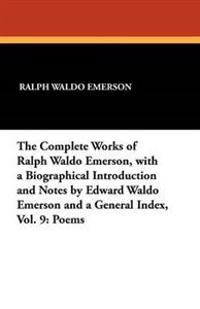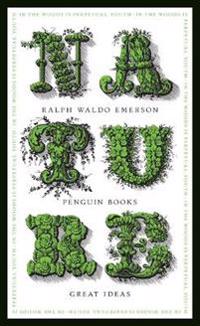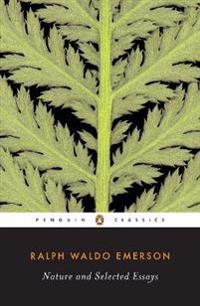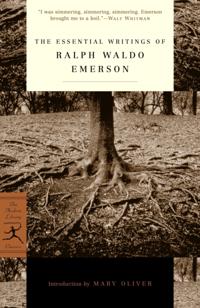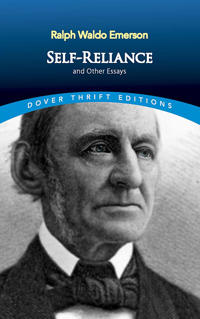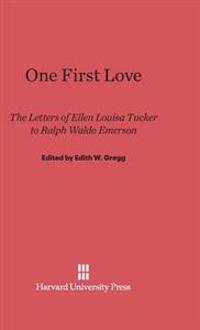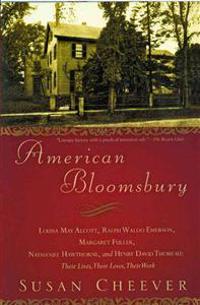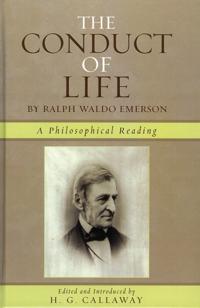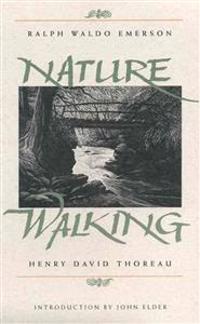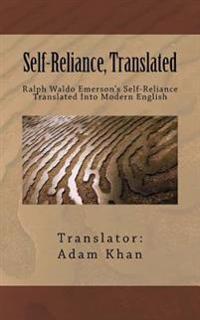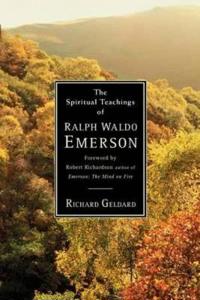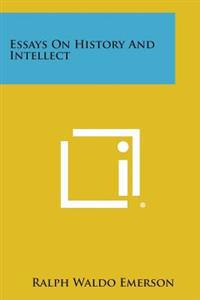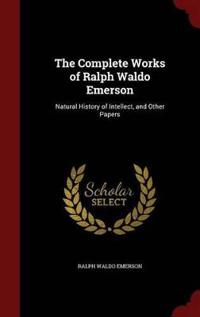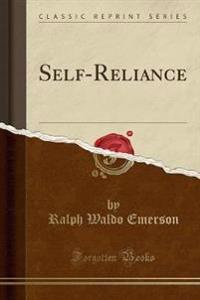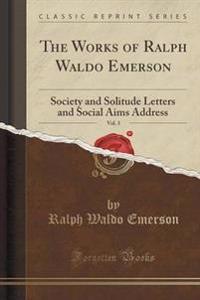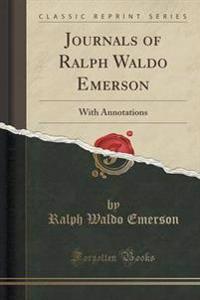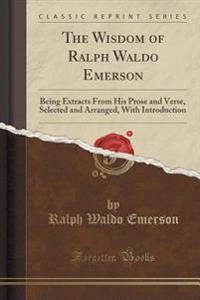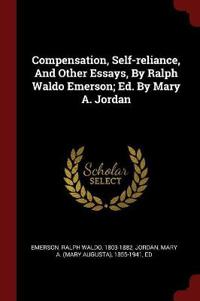The Complete Works of Ralph Waldo Emerson, with a Biographical Introduction and Notes by Edward Waldo Emerson and a General Index, Vol. 9 (häftad)
ISBN: 9781434421548 - UTGIVEN: 2010-06Nature (Storpocket)
avRalph Waldo Emerson
ISBN: 9780141036823 - UTGIVEN: 200808Originally published anonymously, "Nature" was the first modern essay to recommend the appreciation of the outdoors as an all-encompassing positive force. Emerson's writings were recognized as uniquely American in style and content, and launched the idea of going for a walk as a new way of looking a[...]
Nature and Selected Essays (Storpocket)
avRalph Waldo Emerson
ISBN: 9780142437629 - UTGIVEN: 200304Through his writing and his own personal philosophy, Ralph Waldo Emerson unburdened his young country of Europe's traditional sense of history and showed Americans how to be creators of their own circumstances. His mandate, which called for harmony with, rather than domestication of, nature, and for[...]
Essential Writings of Ralph Waldo Emerson
ISBN: 9780307419910 - UTGIVEN: 2015-06Introduction by Mary Oliver Commentary by Henry James, Robert Frost, Matthew Arnold, Oliver Wendell Holmes, and Henry David Thoreau The definitive collection of Emerson's major speeches, essays, and poetry, The Essential Writings of Ralph Waldo Emerson chronicles the life's work of a true ';America[...]
Selected Works (Pocket)
avPaul Lauter, Margaret Fuller, John Carlos Rowe, Ralph Waldo Emerson
ISBN: 9780395980750 - UTGIVEN: 2002-04-25The first book of its kind to pair the writings of Emerson and Fuller, this text plays a major role in illuminating the contributions of both men and women to American Transcendentalism. In addition to a generous selection of Emerson's essays, the complete text of Margaret Fuller's Woman in the Nine[...]
Self Reliance (Häftad)
avRalph Waldo Emerson
ISBN: 9780486277905 - UTGIVEN: 199402See 'Bhagavad Gita'.
Self-Reliance: The Wisdom of Ralph Waldo Emerson as Inspiration for Daily Living (Häftad)
ISBN: 9780517585122 - UTGIVEN: 1991-11A finely honed abridgement of Emerson's principal essays with an introduction that clarifies the essence of Emerson's ideas and establishes their relevance to our own troubled era. This is the first truly accessible edition of Emerson's work, revealing him to be one of America's wisest teachers. [...]
Collected Works of Ralph Waldo Emerson, Volume I: Nature, Addresses, and Lectures
ISBN: 9780674139701 - UTGIVEN: 1971-01In 1849 Ralph Waldo Emerson collected in one volume all of his published work he thought worthy of preservation that had not been contained in the two series of Essays (1841, 1844) and the Poems (1847). Included were the essay Nature (1836); four orations, "The American Scholar," "The Divinity Schoo[...]
One First Love: The Letters of Ellen Louisa Tucker to Ralph Waldo Emerson (Inbunden)
avEllen Louisa Tucker, Edith W. Gregg
ISBN: 9780674434097 - UTGIVEN: 2013-10Letters, poems, and fragments of a journal are the only first-hand reflection we have of a personality of major importance in the life of Ralph Waldo Emerson, that of the beautiful and gifted Ellen Louisa Tucker, whom he married in 1829. Blithe, humorous, full of charm and candor, the engaging seven[...]
American Bloomsbury: Louisa May Alcott, Ralph Waldo Emerson, Margaret Fuller, Nathaniel Hawthorne, and Henry David Thoreau: Their Lives, Th (häftad)
ISBN: 9780743264624 - UTGIVEN: 2007-09The 1850s were heady times in Concord, Massachusetts: in a town where a woman's petticoat drying on an outdoor line was enough to elicit scandal, some of the greatest minds of our nation's history were gathering in three of its wooden houses to establish a major American literary movement. The Trans[...]
The Conduct of Life (Häftad)
avRalph Waldo Emerson
ISBN: 9780761834113 - UTGIVEN: 200603Ralph Waldo Emerson's 1860 book, The Conduct of Life is among the gems of his mature works. First published in the year of Abraham Lincoln's election as President, this work poses the questions of human freedom and fate. This new edition emphasizes Emerson's philosophy and thoughts on such issues as[...]
Nature and Walking (Häftad)
avRalph Waldo Emerson, Thomas W. Nason
ISBN: 9780807014196 - UTGIVEN: 199407Self-Reliance, Translated: Ralph Waldo Emerson's Self-Reliance Translated Into Modern English (Häftad)
avAdam Khan
ISBN: 9780962465611 - UTGIVEN: 201205The Spiritual Teachings of Ralph Waldo Emerson
ISBN: 9780970109736 - UTGIVEN: 2001-03No one who has ever felt the life-changing pull of Emerson's enormous mind, has ever doubted his power or his greatness; though we are often puzzled to know whether he is primarily a poet, an essayist, or a philosopher. Richard Geldard is not puzzled at all by this: he has written a book which plai[...]
Essays on History and Intellect (Häftad)
avRalph Waldo Emerson
ISBN: 9781258992279 - UTGIVEN: 2013-10Words of Wisdom: Ralph Waldo Emerson
ISBN: 9781312461505 - UTGIVEN: 2015-06Ralph Waldo Emerson is considered as one of the most famous American essayists and lecturers; however, he was also a good poet. In the mid-19th century, he was the leader of the Transcendentalist movement. He is often called the champion of individualism. He was fiercely against the countervailing p[...]
Self-Reliance (Classic Reprint) (Pocket)
avRalph Waldo Emerson
ISBN: 9781331125075 - UTGIVEN: 2015-07The Works of Ralph Waldo Emerson, Vol. 3: Society and Solitude Letters and Social Aims Address (Classic Reprint) (häftad)
ISBN: 9781331223252 - UTGIVEN: 2015-07Compensation, Self-Reliance, and Other Essays, by Ralph Waldo Emerson; Ed. by Mary A. Jordan (häftad)
ISBN: 9781376218534 - UTGIVEN: 2017-08

